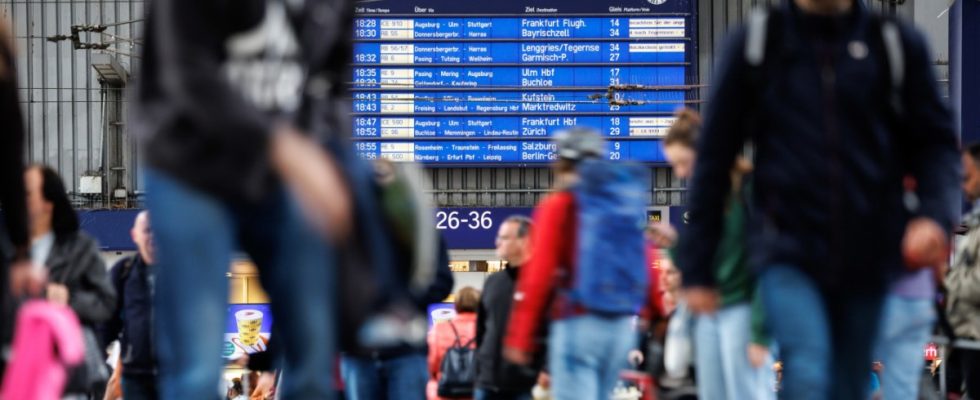New confrontation at the railways: The EVG union also rejects the group’s improved wage offer of up to twelve percent for two years. This is “socially unfair” because too little is being done for lower wage groups, the EVG explained late Tuesday evening. It is initially unclear whether there will be further strikes. EVG negotiator Kristian Loroch called on the railways to make a completely new offer and to negotiate this Wednesday. “That should be in the interest of the railways, because as long as we sit at the negotiating table, there will be no strike,” warned Loroch.
Negotiations are being made for a good 200,000 employees from various train companies, most of whom work for Deutsche Bahn. In the collective bargaining negotiations, which were very tough this time, there have already been two warning strikes, during which the EVG union paralyzed train services for millions of travelers for almost a day. A third strike, planned to last around 50 hours, was called off at the last minute.
Deutsche Bahn increased its offer again last week to get things moving in the negotiations. The group now offers twelve percent more wages for employees who earn rather little. Those who earn medium or high would get ten or eight percent more salary. There is also an inflation premium of 2850 euros for all employees.
The group made improvements in several places after the EVG union had put pressure on with warning strikes. Money should flow quickly to help the employees suffering from the sharp rise in prices. They would receive half of the inflation premium as early as July. In addition, at least half of the permanent wage increase, as demanded by the union, should apply from this year.
The permanent salary increase of up to twelve percent even corresponds to the union’s original demand. However, the EVG requires this increase for only one year in order to then negotiate further salary increases. The railways, on the other hand, want to distribute the wage increase over a period of two years for the collective agreement. This makes it clear that there are still clear differences between the two sides.
Now the train drivers are coming
“Essential points of our demands are still not met,” said EVG negotiator Loroch and called the course of action “unacceptable”. The planned percentage scale puts the lower wage groups at a disadvantage, for which the aim is to get significantly more out this time. The EVG demands twelve percent more wages, but at least 650 euros more, which would mean a large premium for lower wage groups.
“Last week we discussed with Deutsche Bahn what changes are conceivable to resolve the existing injustices and how the minimum amount we demanded could be reflected. Unfortunately, none of this is reflected in the offer that was presented to us last week “, criticized Loroch.
There is speculation that the EVG union may want to wait until the rival train driver union presents its wage demands for the current wage round on June 5 before finalizing a deal. In the past, the significantly smaller GDL had mocked the EVG for moderate salary settlements. For example, when the EVG agreed to small wage increases during the corona pandemic because the trains were empty and the railway was making high losses. The EVG union therefore wants to avoid the impression that it is too tame in salary talks. However, according to the EVG, there have so far been only a few employees who switch from one union to another.
The GDL, which almost always resorts to strikes, is already asking for their salary. Negotiations should not be made until autumn. As soon as the ECG and the railway companies agree, the train passengers will have a breathing space.

